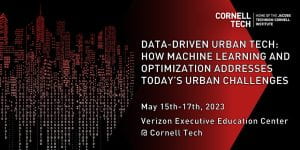May 15 – 17, 2023 @ Cornell Tech, NYC

This workshop will bring together researchers and practitioners from academia and industry to discuss challenges and recent advances in the field. Panels and presentations will showcase how machine learning, optimization and other algorithmic tools can make cities more equitable, efficient and sustainable
Technological innovations are creating opportunities for cities to rethink the way in which they address pressing and complex challenges. These include: mitigating and adapting to climate change, which has prompted researchers to design innovative prevention tools and disaster relief measures with the goal of making cities more robust; responding to the algorithmic economy (e.g., ride-hailing, bike-sharing systems, delivery systems), which has revolutionized our interactions with each other in the city; innovations in real-time information to help users’ decision-making, including smart infrastructure that aims to create a more sustainable ecosystem (e.g., energy efficient buildings, robust communication networks, smart grids); and other developments across mobility, healthcare and, in general, public and private services, including the adoption of autonomous vehicles, computer-assisted healthcare, analytics for water management, robust supply chains, among others. These developments bring myriad new questions around security, privacy, efficiency, equity, and complexity, alongside old challenges in urban planning. This workshop will consider how machine learning and data-driven approaches can be used to improve quality of life in urban environments.
Jacob Abernethy (Georgia Institute of Technology)
Sara Bronin (Cornell University)
Rachel Cummings (Columbia University)
Vanessa Frias-Martinez (University of Maryland)
Umberto Fugiglando (Senseable City Lab, MIT)
Nikhil Garg (Cornell Tech)
Eugenia Giraudy (Meta)
Alexandre Jacquillat (Massachusetts Institute of Technology)
Cristiana Lara (Amazon)
Neal Parikh (Columbia University)
Alexander Rush (Cornell Tech)
Xiaoyan Si (Amazon)
Maria João Sousa (Cornell Tech)
Milind Tambe (Harvard University)
Angelique Taylor (Cornell Tech)
Pascal Van Hentenryck (Georgia Institute of Technology)
Ellen Vitercik (Stanford University)
Manxi Wu (Cornell University)
Data- Driven Urban Tech Workshop
Poster Sessions
Poster Session 1 – Monday, May 15, 1:15-2:45 pm
Poster Session 2 – Tuesday, May 16, 1:30 – 3:00 pm
SCHEDULE
(subject to change)
May 15 – Monday
(breakfast on your own)
-
-
- 09:50-10:00am Opening remarks
- 10:00-10:45am Pascal Van Hentenryck (Georgia Institute of Technology) On-Demand Multimodal Transit Systems: From Concepts to Pilots
- 10:45-11:30am Alexandre Jacquillat (Massachusetts Institute of Technology) Design and optimization of hybrid microtransit systems
- 11:30-12:00pm Coffee Break
- 12:00-12:45pm Vanessa Frias-Martinez (University of Maryland) Data-driven decision making for resilient and equitable cities
- 12:45-01:15pm Sara Bronin & Alexander Rush (Cornell University) Automating Analysis of Zoning Codes for the National Zoning Atlas
- 01:15-02:45pm Lunch (provided) + Poster session 1
- 02:45-03:15pm Umberto Fugiglando (Senseable City Lab, MIT) Bits, Bricks, and People: Senseable Cities
- 03:15-03:45pm Rachel Cummings (Columbia University) Improving Communication with End Users and Stakeholders about Privacy Guarantees
- 03:45-04:00pm Coffee Break
- 04:00-05:30pm Company/Organization Presentations + Q&A
– BetaNYC, Kate Nicholson, Director of Programs and Partnerships Stories from the streets, making NYC open data accessible, understandable, and comfortable to sit on
– Empire State Realty Trust – Dana Robbins Schneider, Senior VP, Director of Energy, Sustainability & ESG
– Replica, Steven Turell, Chief of Staff Data and Urban Decision Making - 05:30-07:30pm Reception
-
May 16 – Tuesday
(breakfast on your own)
-
-
- 10:00-10:45am Milind Tambe (Harvard University) – AI for social impact: Results from deployments for public health
- 10:45-11:30am Angelique Taylor (Cornell Tech) Perception and Decision-Making Systems for Human-Robot Teaming in Safety-Critical Environments
- 11:30-12:00pm Coffee Break
- 12:00-12:45pm Eugenia Giraudy (Meta) – Using big data to support humanitarian organizations during major world crises
- 12:45-01:30pm Cristiana Lara & Xiaoyan Si (Amazon) Re-engineering Amazon’s logistics network to optimize for speed, cost and selection
- 01:30-03:00pm Lunch (provided) + Poster session 2
- 03:00-03:45pm Manxi Wu (Cornell University) – Improving Efficiency and Equity in Tolling: A market design approach.
- 03:45-04:30pm Jacob Abernethy (Georgia Institute of Technology) – Machine learning and the search for lead pipes
- 04:30-04:45pm Coffee Break
- 04:45-05:45pm Neal Parikh (Columbia University) Reflections on AI in NYC government
- 10:00-10:45am Milind Tambe (Harvard University) – AI for social impact: Results from deployments for public health
-
May 17 – Wednesday
(breakfast on your own)
-
-
- 10:00-10:45am Maria João Sousa (Cornell Tech) Tackling Climate Change with Machine Learning
- 10:45-11:30am Ellen Vitercik (Stanford University) Leveraging Reviews: Learning to Price with Buyer and Seller Uncertainty
- 11:30-12:00pm Coffee Break
- 12:00-12:45pm Nikhil Garg (Cornell Tech) – Efficiency and equity design and engineering in resident crowdsourcing
- 12:45-02:00pm Lunch (provided)
-
Organizing Committee:
Nikhil Garg– Asst. Professor at the Jacobs Technion-Cornell Institute, Cornell Tech
Andrea Lodi–Andrew H and Ann R. Tisch Professor at the Jacobs Technion-Cornell Institute, Cornell Tech
Michael Samuelian–Founding Director of the Jacobs Urban Tech Hub at Cornell Tech
Katya Scheinberg–Professor, Operations Research and Information Engineering, Cornell
Alfredo Torrico – Asst. Research Professor, Cornell’s Center for Data Science for Enterprise and Society
SPONSORS
This workshop is partially funded by a NSF TRIPODS+X grant to Institute for Data, Intelligent Systems, and Computation (I-DISC) at Lehigh University, hosted by Cornell Tech and co-sponsored by the Cornell Center for Data Science for Enterprise and Society.

